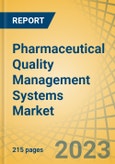Succeeding extensive secondary and primary research and in-depth analysis of the market scenario, the report studies the key industry drivers, restraints, challenges, and opportunities. The growth of this market is driven by the increasing costs of drug manufacturing, pharmaceutical companies growing need to comply with regulatory requirements, the rapid growth of the pharmaceutical industry, and the benefits of software-based quality management systems. Additionally, the growing generic drugs & and biopharmaceuticals markets and pharmaceutical companies' increasing preference for platform-as-a-service solutions are expected to generate growth opportunities for the players in this market. However, the high costs of deploying pharmaceutical quality management systems restrain the growth of this market. Security concerns related to on-cloud deployments among pharmaceutical organizations are a major challenge for market growth.
Based on solution type, the pharmaceutical quality management systems market is segmented into non-conformance/deviation management, CAPA management, audit management, risk & compliance management, suppliers & materials management, inspection management, document management, change management, training management, and other solution types. The CAPA management segment is expected to grow at the highest CAGR during the forecast period. The need for Corrective and Preventive Action (CAPA) management in the pharmaceutical industry is driven by several factors that ensure product quality, patient safety, and regulatory compliance. CAPA management is essential for addressing issues and preventing their recurrence, further contributing to the overall integrity of pharmaceutical operations.
Based on deployment mode, the global pharmaceutical quality management systems market is segmented into cloud/web-based and on-premise. In 2023, the cloud/web-based segment is expected to account for the largest share of the pharmaceutical quality management systems market. The largest share of this segment is attributed to several advantages offered by cloud/web-based deployments over on-premise deployments, such as cost minimization, easy accessibility, adjustability, and updated cloud systems. Another major advantage of web-based deployments is the lower risk of data loss through better encryption and data backup.
Based on end user, the global pharmaceutical quality management systems market is segmented into pharmaceutical and biotechnology companies, contract development and manufacturing organizations/contract research organizations, and research laboratories. The pharmaceutical and biotechnology companies segment is expected to grow at the highest CAGR during the forecast period. The highest CAGR of the segment is attributed to increasing R&D investments by pharmaceutical & biotechnology companies, widespread utilization of quality management systems to ensure product quality, and a growing emphasis on personalized medicine research.
An in-depth analysis of the geographical scenario of the pharmaceutical quality management systems market provides detailed qualitative and quantitative insights into five major geographies: North America, Europe, Asia-Pacific, Latin America, and the Middle East & Africa, along with the coverage of major countries in each region. Asia-Pacific is slated to register with the highest CAGR during the forecast period. The healthcare needs of people in Asia-Pacific countries are progressively increasing due to the rising burden of chronic diseases. A large population pool and government initiatives to improve healthcare facilities and services in these countries are the key factors supporting the growth of the Asia-Pacific market. These countries have also been identified as low-cost destinations for pharmaceutical manufacturers for a long time, which further supports the growth of this market in Asia-Pacific.
Some of the key players operating in the global pharmaceutical quality management systems market are Honeywell International Inc. (U.S.), IQVIA Holdings Inc. (U.S.), ANTARES VISION S.p.A (Italy), Dassault Systèmes SE (France), EtQ Management Consultants, Inc. (U.S.), Ideagen PLC (U.K.), Körber AG (Germany), LogicGate, Inc. (U.S.), ComplianceQuest, Inc (U.S.), AssurX, Inc. (U.S.), and AXSource Consulting, Inc. (U.S.).
Scope of the Report:
Pharmaceutical Quality Management Systems Market Assessment by Solution Type
- Non-conformance/Deviation management
- Document Management
- CAPA Management
- Risk & Compliance Management
- Inspection Management
- Audit Management
- Suppliers & Materials Management
- Training Management
- Change Management
- Other Solution Types
Pharmaceutical Quality Management Systems Market Assessment, by Deployment Mode
- Cloud/Web-based
- On-Premise
Pharmaceutical Quality Management Systems Market Assessment, by End User
- Pharmaceutical and Biotechnology Companies
- CDMO/CRO
- Research Laboratories
Pharmaceutical Quality Management Systems Market Assessment, by Geography
- North America
- U.S.
- Canada
- Europe
- Germany
- France
- U.K.
- Italy
- Spain
- Ireland
- Belgium
- Netherlands
- Rest of Europe
- Asia-Pacific
- China
- Japan
- India
- Singapore
- Malaysia
- Philippines
- Vietnam
- Rest of Asia-Pacific
- Latin America
- Brazil
- Mexico
- Rest of Latin America
- Middle East & Africa
Table of Contents
Companies Mentioned
- Honeywell International Inc. (U.S.)
- IQVIA Holdings Inc. (U.S.)
- ANTARES VISION S.p.A (Italy)
- Dassault Systèmes SE (France)
- EtQ Management Consultants Inc. (U.S.)
- Ideagen PLC (U.K.)
- Körber AG (Germany)
- LogicGate Inc. (U.S.)
- ComplianceQuest Inc (U.S.)
- AssurX Inc. (U.S.)
- AXSource Consulting Inc. (U.S.)








